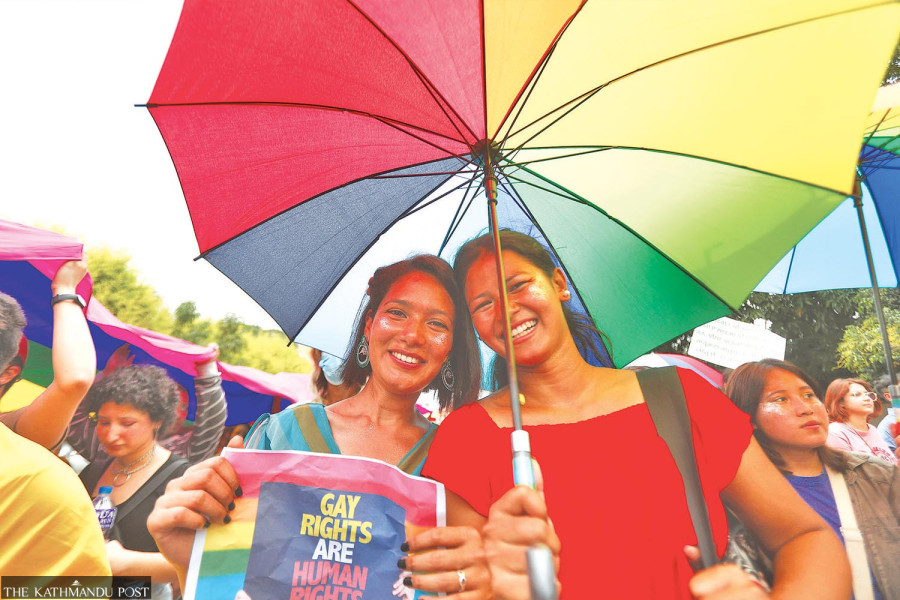National
Nepal’s queer community watching India with interest
Supreme Court of Nepal in 2007 ordered the government to recognise same-sex marriages, but there’s no law yet.
Anup Ojha
Last week, the Indian government made its opposition to same-sex marriage be known by urging the country’s Supreme Court to reject petitions filed by same-sex couples.
The Supreme Court on Tuesday started final hearings on the issue even as the government and religious leaders have taken strong exception to same-sex unions. The hearing is taking place after 18 same-sex couples petitioned the court to allow same sex marriages in the country.
While in India, same-sex couples and lesbian, gay, bisexual, transgender and queer (LGBTQ) activists have their fingers crossed, the issue has also drawn the attention of Nepal’s queer rights activists.
“We are closely following the issue,” said Rukshana Kapali, a queer rights activist. “With regard to same-sex marriages, and the rights of queer people, Nepal is quite ahead.”
Nepal’s constitution recognises LGBTQ rights as fundamental human rights. On March 23, 2007, the Supreme Court ordered the Nepal government to legally recognise same-sex marriages to ensure protection for gender and sexual minorities in the country. That is why Nepal is often considered progressive in terms of LGBTQ rights in South Asia but same-sex marriages still remain illegal in the country.
“Our law reflects our larger society,” said senior advocate Sunil Pokharel.
Nepal introduced a ‘third gender’ category besides ‘male’ and ‘female’ in the citizenship documents in 2013 and the country started issuing passports with the ‘other’ category two years later. Gay and transgender Nepalis and rights activists say much remains to be done to advance queer rights in Nepal.
Reports have pointed out that Nepal’s estimated 900,000-strong LGBTQ community still faces discrimination when it comes to finding jobs and accessing health services and education.
“But compared to the past decade, more queer are coming out, and many have started speaking up for the community,” Kapali said. “I see it as a positive change.”
Last year, the Tribhuvan University had refused to issue an exam registration number as a transgender student to Kapali. After she raised the issue on social media, the university received much public backlash and eventually presented Kapali with an admit card as she wanted it.
“It shows that there are many people who are supporting our cause, but it’s really hard for people who are not vocal,” said Kapali, adding that queers continue to face constant harassment and attacks and some have even been murdered.
The problem is worse in India.
“There, the government and religious hardliners are very conservative when it comes to recognising the rights of the queer community,” Kapali said. “We in Nepal have a more secular approach to the community.”
The census of 2021 showed that the total number of people with ‘other’ gender is 2,928, which is 0.01 percent of Nepal’s population. But the actual number is much higher, rights activists say.
“This can’t be an authentic population count as many people from the minority groups have not disclosed their identity, fearing social stigma,” said Bhumika Shrestha, vice-president of the Federation of Sexual and Gender Minorities.
The BBC has said India is home to tens of millions of LGBTQ people. In 2012, the Indian government had put their population at 2.5 million, but calculations using global estimates come to at least 10 percent of the entire population or more than 135 million.
Back in Nepal, despite being hailed as a progressive bastion for LGBTQ rights in the region, its Civil Code still acknowledges marriage as when “a man and a woman accept each other as the husband and wife.”
Sexual and gender minorities still find it difficult to get equal treatment before the law. Further, these laws have not translated into changes in the larger society, which still remains conservative.
In 2015, a committee formed to study same-sex marriages submitted an 85-page report to the Prime Minister’s Office, recommending the legalisation of such unions. But that went nowhere.
Many LGBTIQ individuals still find it difficult to get jobs, leading them to resort to sex work, which comes with both health and safety hazards.
As sex work remains illegal in Nepal, it has subjected queer people to harrassment, especially at the hands of police. Consequently, they are reluctant to seek help from the police.
When asked for the reason behind Nepal not being able to formulate a law even after the 2007 Supreme Court verdict asking for recognition of same-sex marriages, Shrestha pointed to the absence of such law’s vocal backers in Parliament.
“We don’t have any representatives in the House of Representatives or in bureaucracy,” Shrestha said. “We lack people to speak up for our cause.”
According to advocate Pokharel, some people started seeing same-sex marriage with suspicion after the issue of surrogacy came to be linked to it in 2015. He said many gay and lesbian foreigners started adopting Nepali children, a trend that came under public scrutiny. In August 2015, Chief Justice Kalyan Shrestha directed all those involved in arranging for paid surrogacy to immediately halt their activities.
Pokharel said the main reason for the absence of a separate law for sexual and gender minority groups is that many of the old and conservative social constructs remain intact.
Pokharel added that law is a reflection of society, and large sections of the society in Nepal still seem reluctant to accept these minority groups. “But change is inevitable,” he said. “Hopefully, such change will not take a long time.”




 18.12°C Kathmandu
18.12°C Kathmandu.jpg)














